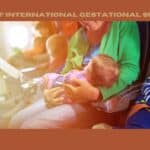Big news broke this past August that the Mediterranean Fertility Institute in Chania Hospital in Crete, the largest Greek island, has come under scrutiny for alleged trafficking of women and children. The accusations are serious, if found to be true. The fertility center has been “accused of exploiting 169 women from countries including Ukraine, Romania, and Georgia, forcing them to be surrogate mothers or egg donors and keeping them under surveillance.” Also, the accusations extend to the who is accused of conducting illegal adoptions and doing “fake IVF treatments”. It appears most of the couples caught up in this scandal are from Australia, where only altruistic (unpaid) surrogacy is permitted. Greece has long been an affordable surrogacy tourism destination for people coming from countries where surrogacy is prohibited or restricted.
Award-winning surrogacy lawyer, Stephen Page, from Brisbane, Australia, describes the situation in Crete as “an absolute utter mess.” About 100 Australian couples are feeling distraught, as their own babies are in a state of limbo, stranded in Crete. Two couples have been permitted to take their babies home from the hospital, after DNA testing confirmed the child was indeed their biological child. They await one last health check before being allowed to leave the country and return home to Australia.
Sam Everingham, global director of Growing Families, a gay man who has two children via surrogacy, wonders if it might be possible that some couples were even given babies who are not genetically their own children. It appears that some Australian couples still have their frozen embryos trapped in the hospital, while other families are in the middle of their surrogacy arrangement, having already hired a surrogate mother who is still pregnant in Greece with their biological child.
Another Australian award-winning “family creation” lawyer, Sarah Jefford (who was an egg donor and a surrogate herself), argues that the time has come to loosen the surrogacy rules in Australian so “surrogacy is safe to do” on Australian soil, arguing this is the way to protect intended parents and their babies.
It is curious that the leading experts speaking out in the media are all profiteers off #BigFertility and all lobbying to relax laws, bring surrogacy back to their home soil, as if this will protect women and children from exploitation and trafficking. One could of course argue that the surrogacy laws in Greece are relaxed which is why it is a reproductive tourism destination. The U.S. has the most relaxed and regulated surrogacy practices and laws and yet surrogates here have died. The babies they carry have died. And yes, surrogates in the U.S. have been exploited and babies have been treated like goods to discard.
Author Profile

- Jennifer Lahl, MA, BSN, RN, is founder and president of The Center for Bioethics and Culture Network. Lahl couples her 25 years of experience as a pediatric critical care nurse, a hospital administrator, and a senior-level nursing manager with a deep passion to speak for those who have no voice. Lahl’s writings have appeared in various publications including Cambridge University Press, the San Francisco Chronicle, the Dallas Morning News, and the American Journal of Bioethics. As a field expert, she is routinely interviewed on radio and television including ABC, CBS, PBS, and NPR. She is also called upon to speak alongside lawmakers and members of the scientific community, even being invited to speak to members of the European Parliament in Brussels to address issues of egg trafficking; she has three times addressed the United Nations during the Commission on the Status of Women on egg and womb trafficking.
Latest entries
 FeaturedOctober 16, 2024Brava Italia! Jennifer Lahl, founder The Center for Bioethics and Culture
FeaturedOctober 16, 2024Brava Italia! Jennifer Lahl, founder The Center for Bioethics and Culture FeaturedSeptember 9, 2024Don’t Make Claims Using Outdated Data
FeaturedSeptember 9, 2024Don’t Make Claims Using Outdated Data BioethicsMay 16, 2024The Ethics of Transplantation Medicine
BioethicsMay 16, 2024The Ethics of Transplantation Medicine infertilityApril 23, 2024The Rise of International Gestational Surrogacy in the U.S.
infertilityApril 23, 2024The Rise of International Gestational Surrogacy in the U.S.





